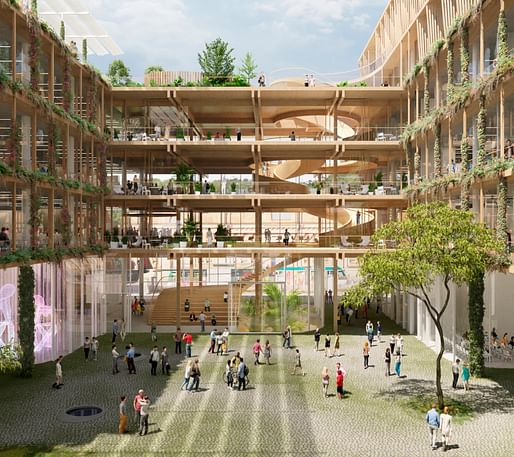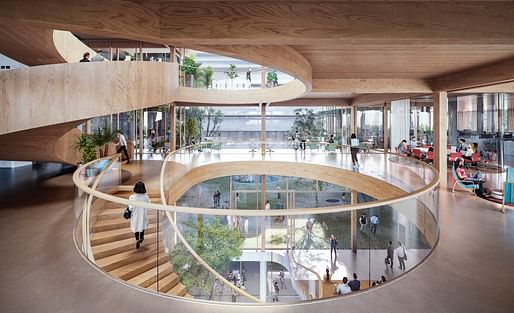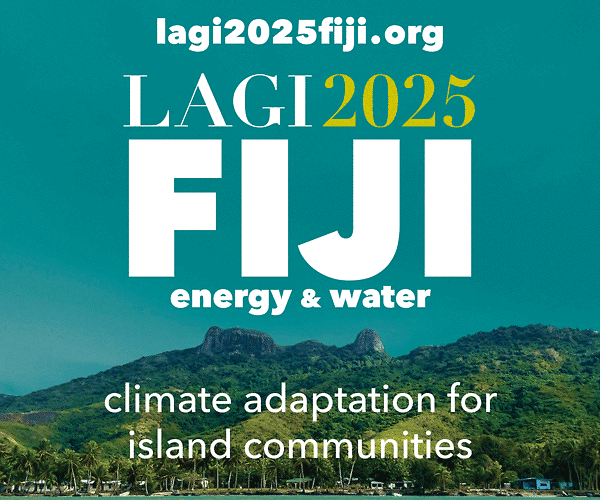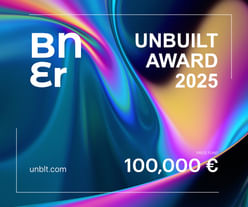
A team comprised of ZGF and Barcelona-based firms MIRAG and Double Twist have been named as competition winners for the design of a net-positive research center in Barcelona. The team won the commission for the Mercat del Peix Research Center seeing off competition from a five-team shortlisting including notable firms such as Kengo Kuma & Associates and Allies and Morrison.
Located adjacent to the Parc de la Ciutadella, a prominent 19th-century public green space, the research center will form part of what has been dubbed the Ciutadella of Knowledge; a contemporary European hub for scientific and cultural innovation. When operational in 2025, the research center will house global experts in experimental sciences, social sciences, and humanities, dedicated to tackling global challenges including biodiversity loss, climate change economics, and governance.

The scheme is composed of two ‘net-positive’ mass timber buildings connected by a central courtyard. The taller building, a seven-story ‘wet lab,’ will house the headquarters of the Institut de Biologia Evolutiva, while the smaller five-story ‘dry lab’ will host a range of interdisciplinary projects for Barcelona’s Universitat Pompeu Fabra. When combined, the buildings will provide over 452,000 square feet of internal space.
The project’s design strategy was orientated around encouraging interaction between the various research entities in the center itself, and the wider Ciutadella of Knowledge. A resulting series of “nuanced design strategies” were implemented to “quietly promote circulation,” including floor-to-ceiling glass, shared floor-to-ceiling heights across buildings, and shared spaces such as the central courtyard and mass timber spiral staircase that terminates at a large roof deck.

Competition jury president Jaume Casals praised the winning scheme as one which “optimally combines ingenuity in meeting the needs of users” and brings a “brightness and boldness” to the site.
The research center’s mass timber building envelope and mechanical systems have been designed to reduce embodied and operational carbon. The envelope contains sun shades that blunt the intensity of Barcelona’s Mediterranean sun while also steering indirect natural light deep into the building. The envelope also features operable windows to provide natural ventilation, while zoned climate controls and chilled beams reduce energy loads without comprising user comfort.
News of the scheme comes months after construction commenced on the ZGF-designed expansion of Portland International Airport; a project also heavily reliant on mass timber. 2022 also saw the firm unveil a new home for the Space Shuttle Endeavour in Los Angeles.

The Last Nuclear Bomb Memorial / Edition #5
Register by Thu, Jan 16, 2025
Submit by Wed, Feb 19, 2025

Kinderspace: Architecture for Children's Development #2
Register by Thu, Jan 16, 2025
Submit by Mon, Jun 16, 2025

Land Art Generator Initiative 2025 Fiji: Climate Resilience for Island Communities
Register/Submit by Mon, May 5, 2025

100,000 € Prize / Buildner's Unbuilt Award 2025
Register by Thu, Oct 30, 2025
Submit by Thu, Nov 20, 2025
No Comments